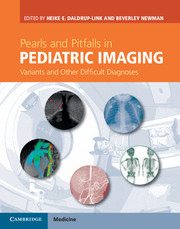Book contents
- Frontmatter
- Contents
- List of contributors
- Preface
- Acknowledgment
- Section 1 Head and neck
- Section 2 Thoracic imaging
- Section 3 Cardiac imaging
- Section 4 Vascular and interventional
- Section 5 Gastrointestinal imaging
- Case 44 Ruptured appendicitis mimicking an intussusception
- Case 45 Choledochal cyst
- Case 46 Henoch–Schönlein purpura
- Case 47 Biliary atresia
- Case 48 Mesenchymal hamartoma of the liver
- Case 49 Lymphoid follicular hyperplasia
- Case 50 Midgut volvulus
- Case 51 Foveolar hyperplasia: post prostaglandin therapy
- Case 52 Pneumatosis cystoides intestinalis
- Case 53 Desmoplastic small round cell tumor
- Case 54 Post-transplantation lymphoproliferative disorder
- Case 55 Traumatic pancreatic injury
- Case 56 Meconium ileus
- Section 6 Urinary imaging
- Section 7 Endocrine - reproductive imaging
- Section 8 Fetal imaging
- Section 9 Musculoskeletal imaging
- Index
- References
Case 53 - Desmoplastic small round cell tumor
from Section 5 - Gastrointestinal imaging
Published online by Cambridge University Press: 05 June 2014
- Frontmatter
- Contents
- List of contributors
- Preface
- Acknowledgment
- Section 1 Head and neck
- Section 2 Thoracic imaging
- Section 3 Cardiac imaging
- Section 4 Vascular and interventional
- Section 5 Gastrointestinal imaging
- Case 44 Ruptured appendicitis mimicking an intussusception
- Case 45 Choledochal cyst
- Case 46 Henoch–Schönlein purpura
- Case 47 Biliary atresia
- Case 48 Mesenchymal hamartoma of the liver
- Case 49 Lymphoid follicular hyperplasia
- Case 50 Midgut volvulus
- Case 51 Foveolar hyperplasia: post prostaglandin therapy
- Case 52 Pneumatosis cystoides intestinalis
- Case 53 Desmoplastic small round cell tumor
- Case 54 Post-transplantation lymphoproliferative disorder
- Case 55 Traumatic pancreatic injury
- Case 56 Meconium ileus
- Section 6 Urinary imaging
- Section 7 Endocrine - reproductive imaging
- Section 8 Fetal imaging
- Section 9 Musculoskeletal imaging
- Index
- References
Summary
Imaging description
A teenage boy presented with increasing abdominal girth and diffuse abdominal pain. Clinical exam revealed a palpable mass in the lower abdomen and pelvis. A CT scan demonstrated a large, predominantly solid mass in the pelvis with evidence of mesenteric and nodal metastases (Fig. 53.1). A biopsy confirmed the suspected diagnosis of a desmoplastic small round cell tumor.
Importance
A desmoplastic small round cell tumor is a very aggressive type of soft tissue sarcoma, which typically presents in adolescent white boys. Ninety percent of the affected patients are males and 85% are white. The tumor shows clinical and imaging characteristics similar to malignant ovarian cancers in women. It grows very fast and often remains unnoticed or misdiagnosed for a long time. When finally diagnosed, most tumors are very large and have already spread, leading to an overall dismal five-year survival rate of less than 15%. Treatment consists of aggressive surgical resection, chemotherapy, and sometimes irradiation. A complete surgical resection is the single most effective intervention to improve outcomes. Thus, an earlier diagnosis is critical to improve the prognosis of these patients.
- Type
- Chapter
- Information
- Pearls and Pitfalls in Pediatric ImagingVariants and Other Difficult Diagnoses, pp. 229 - 230Publisher: Cambridge University PressPrint publication year: 2014



